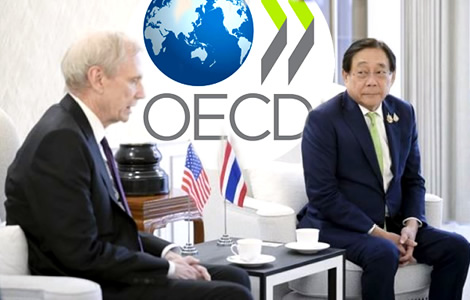Thailand unveils sweeping economic reforms, including negative income tax, VAT changes and new foreign income rules to fight inequality, boost investment, modernise taxation and reshape the economy by 2027 for citizens and foreign residents alike.
At a meeting with U.S. Ambassador Robert F. Godec, Deputy Prime Minister and Finance Minister Pichai Chunhavajira unveiled Thailand’s bold economic shake-up: a negative income tax plan launching in 2027, a U.S. trade deal set to reshape exports, and a fairer tax regime for foreign residents, rolling out in 2026. The concessions apply to all tax residents, Thai and foreign alike. Mr. Pichai emphasized that these reforms signal a decisive shift—combating inequality, boosting competitiveness, and aligning Thailand with Western economies and the OECD to turbocharge foreign investment. A new era for Thailand’s economy is underway.

On Thursday, Deputy Prime Minister and Finance Minister Pichai Chunhavajira met with U.S. Ambassador to Thailand Robert F. Godec. The meeting, described as cordial, focused on economic cooperation and trade issues between the two countries. Mr. Pichai, widely praised by Thailand’s business sector for the recent 19% tariff agreement with the United States, emphasised the Kingdom’s commitment to tackling the transhipment of goods to the U.S. through Thailand from third countries.
It is understood that the primary focus of U.S. Customs and Border Protection (CBP) remains China, which is understood to be the main source of such activities designed to evade higher U.S. tariffs.
Therefore, Thailand is determined to ensure its trade channels are not exploited. Officials reiterated that the government will work closely with the CBP to prevent these practices.
Thailand plans negative income tax and easing of monetary policy to boost fairness and economic growth
Following the meeting, Mr. Pichai outlined the government’s wider economic agenda. Notably, he highlighted that Thailand will implement a full-scale negative income tax system by 2027. This system aims to create a more equitable approach to social assistance while broadening the country’s tax base.
Furthermore, it comes as the kingdom is expected to loosen monetary policy in tandem with the new tax system, which could transform Thailand’s economic landscape in the next few years. Significantly, this is expected to lead to a weaker Thai baht. This is, of course, in turn likely to kickstart foreign tourism and underpin Thailand’s export competitiveness.
The Deputy Prime Minister explained that the negative income tax will allow the government to identify low-income earners accurately and allocate assistance more efficiently.
Consequently, this system is designed to replace traditional welfare handouts with targeted support based on actual income. Officials stressed that this approach ensures fairness and efficiency in government spending.
Negative income tax will require nearly all Thais to file taxes while consolidating aid for fairness and efficiency
Thailand currently has a population of approximately 67 million, yet only about 10 million people, or 15%, are registered taxpayers. Of these, only 4 million individuals pay substantial income tax. As a result, Mr. Pichai said the negative income tax will require nearly all residents to file income tax returns by 2027. Consequently, the government will gain a clearer picture of household incomes, enabling better allocation of state resources.
Under the new system, support will be progressive. Individuals earning below ฿60,000 per year will receive government assistance calculated based on the difference between their income and the poverty threshold. Presently in Thailand, this is ฿3,046 per month or ฿36,552 per year. As incomes approach or exceed this threshold, support gradually diminishes. Moreover, Mr. Pichai emphasised that this model incentivises work while ensuring social protection.
Previously, the government allocated more than ฿60 billion annually to support farmers and low-income citizens. However, this budget has been reduced to roughly ฿40 billion per year in recent cycles. Consequently, the new negative income tax regime will consolidate these programs, creating a single, streamlined channel for assistance.
The Finance Ministry is also considering raising the Value Added Tax (VAT) rate, which has remained at 7% for over two decades. Mr. Pichai noted that several countries in Southeast Asia, including Indonesia, have raised VAT to 12%. Therefore, adjusting VAT could generate sustainable revenue for the government while targeting high-spending consumers.
VAT changes will fund public services while protecting low-income earners and attracting investment
“The VAT increase will affect those who consume the most, while the revenue generated will be reinvested in public infrastructure, education, and healthcare,” he said. At the same time, the government plans protective measures for low-income earners, ensuring access to affordable utilities, public transportation and essential services.
These reforms are part of a broader vision to make Thailand’s economy more competitive and sustainable. Indeed, the government intends to attract inward investment from Western countries, aligning its policies with OECD standards.
Furthermore, it is confirmed that foreign nationals, including retirees and expats who qualify as tax residents, will receive the same treatment as Thai citizens.
Thailand’s tax reform has significant implications for expats. Under amendments effective January 1, 2024, tax residents must declare foreign-sourced income if it is remitted to Thailand.
Previously, such income was taxed only if transferred during the year it was earned. However, the 2025 draft exemption allows income earned from 2024 onwards to remain tax-free if remitted within two years. This window gives residents time to adjust while complying with new rules.
Tax rules clarified for expat tax residents. Exemptions for pre-2024 income. Non-residents unaffected
Individuals earning foreign income before January 1, 2024, remain exempt from these provisions. Additionally, officials stressed that the rules are not retroactive. Only income brought into Thailand after the relevant period is taxable, and non-residents remain unaffected.
Tax residents are defined as those spending at least 180 days in Thailand in a calendar year, including many holding long-term visas, including retirement, non-immigrant, business, student, marriage, or Thai Elite visas. Therefore, these individuals are eligible for the two-year foreign income remittance exemption. Non-residents pay tax only on domestic income.
Thailand taxes income progressively, starting at 5% for earnings above ฿150,000 per year, scaling up to 35% for income exceeding ฿5 million annually. Under the negative income tax system, those earning below the minimum threshold will receive state support rather than paying tax, creating a more equitable distribution of resources.
Mr. Pichai explained that only 15% of workers currently file income tax returns, and only 6% pay significant taxes. By 2027, the negative income tax, combined with broader VAT collection, is expected to increase compliance and fairness. Certainly, this dual approach will expand the tax base and strengthen government revenue.
Strong fiscal position and cooperation with U.S. support trade compliance and boosted inward investment
Thailand’s public finances remain a key strength. The country’s debt-to-GDP ratio stands at 64.2%, below the 70% limit imposed by the State Fiscal and Financial Disciplines Act 2018. Moreover, 99.2% of government bonds are held domestically, reducing vulnerability to external financial shocks. Therefore, Thailand’s fiscal stability continues to attract investors.
The Deputy Prime Minister emphasised that these measures will support long-term economic growth despite current political and GDP challenges. By enhancing revenue collection and ensuring equitable support, Thailand seeks to balance development and fiscal responsibility.
During the meeting, Ambassador Godec reiterated U.S. support for Thailand’s efforts to address trade and tariff concerns. Both sides highlighted the importance of preventing transhipment, particularly with the 19% tariff agreement now in place. Many of the details of what is a large trade deal are still being ironed out. In addition, officials discussed ongoing cooperation between Thailand and the U.S. Customs and Border Protection to monitor compliance.
Sasikarn Wattanachan, deputy spokesperson for the Prime Minister’s Office, said negotiations with U.S. trade representatives produced actionable proposals. Consequently, “Thailand is committed to implementing solutions that address U.S. concerns effectively,” she noted. Both governments aim to maintain fair trade and strengthen bilateral economic ties.
Thailand strengthens tax framework to attract investors and clarify expat and offshore investor obligations
Thailand’s position as an investment destination remains strong. Low public debt, sound domestic bond holdings, and structured fiscal policy continue to attract foreign investors. Despite global economic uncertainty, Thailand is recognised as a stable and predictable market within Southeast Asia.
The negative income tax system, higher VAT tax and enhanced reporting for foreign income aim to modernise the taxation framework while keeping Thailand attractive for expatriates and investors. Additionally, officials highlighted that all reforms comply with OECD standards, reinforcing transparency and predictability.
For foreign retirees, freelancers, and returning Thai nationals, these measures clarify obligations while providing targeted support. Moreover, the Revenue Department emphasised that the reforms are designed to balance fairness with competitiveness. Exceptions exist for inheritance, life insurance payments, specific pensions and gifts, ensuring that certain forms of income remain untaxed.
Thailand aligns reforms with OECD guidance to revamp taxation, support equitable growth and world standards
The government’s long-term strategy aligns with OECD guidance, promoting a Western-style tax and economic framework. Thus, Thailand seeks to combine fiscal responsibility with social protection, using data-driven mechanisms to optimise public resources.
Undeniably, Thailand is pursuing an ambitious economic shift. The negative income tax system will centralise support for low-income citizens. Meanwhile, VAT adjustments will broaden revenue collection. Expanded reporting obligations will ensure compliance. Together, these reforms aim to strengthen the tax base and enhance fiscal stability.
Thailand’s engagement with U.S. officials emphasises its commitment to fair trade and transparency. At the same time, the Kingdom is determined to address transhipment issues while maintaining competitive trade policies. Reforms for expats and Thai residents alike aim to modernise taxation, promote equity and sustain economic growth.
Officials expect the reforms to take full effect by 2027, creating a more inclusive and robust economic environment. In short, through careful policy implementation, Thailand intends to maintain its reputation as a favourable destination for both investment and residency.
Compliance and tax reforms aim to support residents, attract investment, and modernise Thailand’s economy
The government has stated that while compliance requirements will increase, the reforms remain focused on fairness, economic development and long-term fiscal sustainability. Therefore, the measures will benefit all residents, Thai and foreign alike.
By introducing a negative income tax, revising VAT, and clarifying expat tax obligations, Thailand is positioning itself to attract more investment, support low-income households, and improve public infrastructure. Of course, this multi-faceted approach reflects a broader commitment to economic modernisation.
New boss at top Thai economic agency from October 1 at the same time as new Central Bank Governor
Printing money, allowing more liquidity and a cheaper baht may be the economic medicine Thailand needs
Experts note that these reforms could serve as a model for other ASEAN countries seeking to balance fiscal responsibility, social welfare and international competitiveness. In addition, observers have praised Thailand’s transparent approach to implementing policy reforms while engaging with international stakeholders.
In summary, Thailand’s planned reforms are ambitious but structured. They aim to increase fiscal responsibility, protect low-income citizens, ensure fair taxation and strengthen the country’s global economic position. By 2027, the government expects these measures to create a more equitable, efficient, resilient and dynamic economy that benefits all residents.
Join the Thai News forum, follow Thai Examiner on Facebook here
Receive all our stories as they come out on Telegram here
Follow Thai Examiner here
Further reading:
New boss at top Thai economic agency from October 1 at the same time as new Central Bank Governor
Rate cut anticipated as outgoing Bank of Thailand governor attends last Monetary Policy Committee
Last minute tweaks in Bangkok as deal is finalised with U.S. However, Thailand may not match Vietnam


















